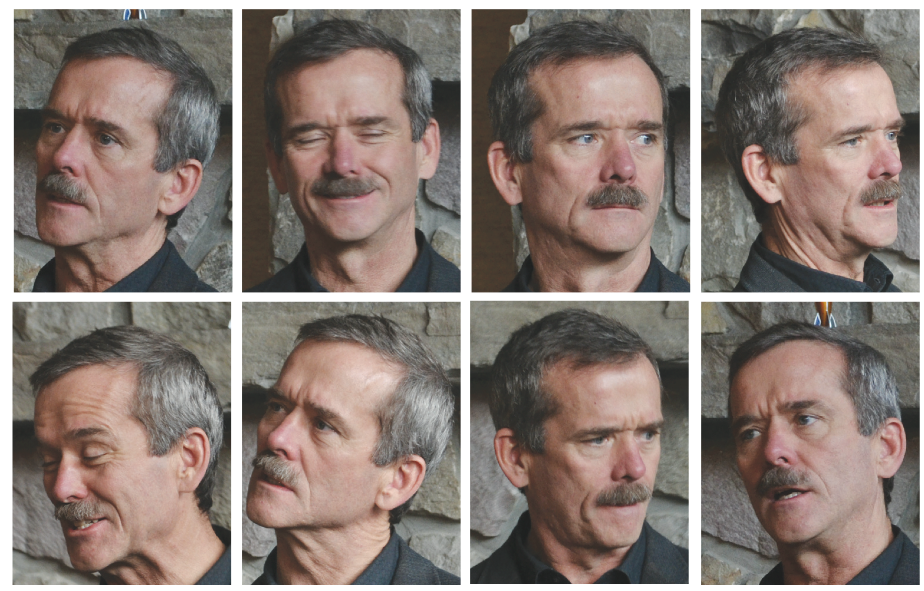
For someone who spent 146 days as far removed from humanity as is currently possible, Chris Hadfield is remarkably relatable.
Maybe it’s the moustache, that beacon of trust and good nature, or maybe it’s just hard not to think about him floating through the International Space Station singing David Bowie. But when the former Canadian astronaut and commander of the ISS visited Jasper Oct. 25 to participate in this year’s fourth annual Dark Sky Festival, he delighted nearly everyone he met.
Hadfield had a whirlwind day. It began with an appearance at Centennial Park, where a line of eager fans snaked away from the canvas tent where he shook hands and signed books for an hour.
Not long after, a throng of people gathered behind crowd-control barricades across the field to watch Hadfield launch a model rocket from the Royal Astronomical Society of Canada.
As the crowd parted, Hadfield strolled up to the model, looking it over with a smile and affably chatting with the operator.
“Wow, look at that,” he exclaimed, elevating his voice for the benefit of the crowd. He told them that space flight is “an amazing new event” in human history, and elicited a wave of awe when he commented that “right now, 330 kilometres above us, six of my friends are up there circling us 15 times a day—[and] each one of them climbed onto one of these things.”
Beyond the celebrity of being an astronaut, Hadfield’s appeal lies in comments like these; in his ability to bring the technologically baffling world of space and space travel to people in a relatable way.
The crowd could see the model rocket—it was a tangible thing. They saw it blast off into the sky, and having Hadfield draw parallels between it and the bewilderingly advanced monstrosities that thunder off the ground to bring humans into space made space exploration seem all the more relevant.
It’s crazy to contemplate. Here’s a man who spent five months physically removed from the other 99.99999999926 per cent of his species, but feels an almost greater sense of connection to them as a result.
Hadfield remembered when he first arrived in space in December 2012. He had spent decades preparing for a moment just like it, but looking down at the globe of the Earth still brought him a sense of wonder.
“Initially, even though you’ve prepared for it, just the wonder of seeing the world—you almost feel like you’re getting something you didn’t deserve,” he told members of the media and Parks Canada Saturday afternoon, during his next appearance of the festival. “That feeling of privilege and sort of a reverence is really overwhelming at first.”
And while initially overwhelmed, Hadfield’s perspective evolved in space. He remembered that after about three months orbiting the Earth, a profound change happened inside him. One day he realized that when he Tweeted to Earth, he had stopped referring to specific populations or races or nationalities, and started referring to everyone, from every part of the world, as “us.”
He talked about passing over Moose Jaw, Sask.—a place he knows well from his childhood. He could pick out the train tracks and highways and rivers in the town, and 20 minutes later he would be over Africa, looking at a small village that also had train tracks and a highway running through it.
“Most people are just good folks—and you just know that little town in Africa that I don’t even know the name of, they’re just the same as the people in Moose Jaw.
“That sense of the shared nature of our existence, that seeps into you. The global perspective of the shared commonality of being human seeps into you more powerfully than you could even imagine.”
Some of those themes popped up again later in the evening, when Hadfield joined former Discovery Channel personality Jay Ingram on stage at Centennial Park. Their talk ended with a performance of “Space Oddity,” the same song that captured much of the world’s heart when Hadfield recorded it from space.
After the show, Hadfield posed for pictures with guests at a VIP event held at the top of Whistlers Mountain, at the Treeline Restaurant.
Outside, the sky was cloudy, but for a brief moment it cleared enough to reveal the luminous starry sky that Jasper had spent all weekend celebrating.
Earlier that day Hadfield had spoken about how looking at the stars can change one’s perspective, and in that moment his words seemed incredibly true.
“It’s so easy to be myopic, not just about the universe, but about so many things. But that type of thinking, I think, is both self-limiting, as well as inherently destructive: it’s really hard to make a good decision if all you think about is your own local concerns.
“We get so wrapped up in our part of this country, or of this world, and we kind of lose the big picture. And I think staring at the endlessness of everything else is ... a reminder of the big picture.
“Everyone should spend a little more time looking up.”
Check out our other coverage of the Jasper Dark Sky Festival.
Trevor Nichols
[email protected]
